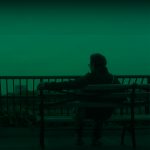I met René a few months from my arrival to work in the City of New York. We were introduced by Pepe (José Luis Cortés), a plastic artist, friend from the University, who had also moved to the city on those dates. One night, after work, Pepe took me to René’s apartment, they were both planning to create a band and needed a bass player. René opened the door of his studio in Williamsburg, Brooklyn and said to me: “So you are the lawyer who plays bass…” and grabbed the Ipod I had in my hand and began to browse its contents. After reviewing the contents for a while, he gave it back to me and said “well, I could really get along with a lawyer who listens to Ministry…”. At first I did not know if this was a joke, but in time I became aware that everything, at all times, was a joke for him. And so, between gag and gag, René became one of my best friends. In this microscopic studio, full of books, compact disks, vinyl albums and dirty dishes, we started to rehearse with an (electric) jarana, an acoustic guitar, a fretless bass, a pair of drumsticks, tambourines, a cardboard box and, of course, a donkey jaw. An so, in time, I would also meet in this stinky studio located in the middle of the New York gentrification epicenter a variety of plastic artists, filmmakers, curators, writers, photographers, but mainly groupies (all René’s friends), witnesses of the birth of Bachelor Sound Machin (BSM) as an exquisite corpse that could not control an absurd need to make a satire of absolutely everything. Like any other band, we started playing covers: Selena (Como La Flor), David Bowie (Space Oddity), Paulina Rubio (Lo Haré por Ti), Brian Addams (Summer of ‘69), Juan Gabriel (Caray) and some “sones jarochos” (traditional music) such as La Sama, Colas y El Guapo. I once suggested that we play Brian Eno’s ‘Baby’s On Fire’ or Carcass’ ‘Incarnated Solvent Abuse’ or some Michael Jackson pieces, but the band ignored me. I never quite understood why my suggestions were not accepted and from these rejections René started calling me “El Sobrino” o “El Sobraz” (sort of a pun for ‘the leftover’ or ‘not needed’). My best experiences with BSM were my struggles with René during “the composition” of the songs and playing El Guapo live, which saved my life. But that is another story… When composing, I usually started by playing something on the bass. Pepe would follow with the drums and some effect (such as a horse’s neigh). Tom would add percussions and so the structure of the song-to-be was being built. René would then add something to the structure and immediately start working on the lyrics, which, inexorable, would be related to some personal matter, such as the luxury bobby socks he had received or given as a gift, some romantic vacations I had taken in France, the unquestionable relationship between the pedicurist and the soldiers who lose all their limbs during the war, or the overwhelming sensations of being the sole heir of a powerful empire when your true calling is to live in Alaska and eat pizza every night. René “wrote” the lyrics of the songs as if they were “son jarocho” (Veracruzan traditional music) rhymes; he first sang on line, then he repeated it adding something, as if it was a joke refusing to come to an end. I usually quarreled with René because he tended to constantly change the lyrics and the structure of the song, to the point that at times I ceased playing and, frustrated, asked him to make a decision on the final structure of the song. I always told him that he may change the lyrics as much as he wished (which in fact he did all the time, and it was much fun because we never played the same song twice). This way we composed a series of great songs that refuse to have a single version. And so, inspired and guided by Tlahuicole, the great Tlaxcalan warrior, we would soon unleash a ridiculous and uncontrollable creative reaction that would take us to play in birthday parties, galleries, multimedia centers, sculptural parks and bars, and even to record an album in the garage of a house somewhere in Pensilvania. BSM ended with René’s death, being impossible to move on without the band´s creative soul. I miss his words, his humor, but most of all his friendship.
Miguel Medrano.
2020

